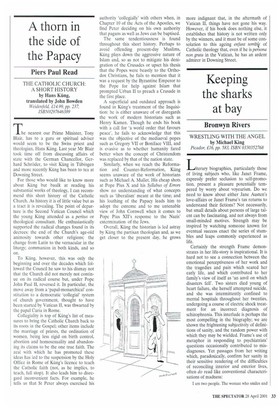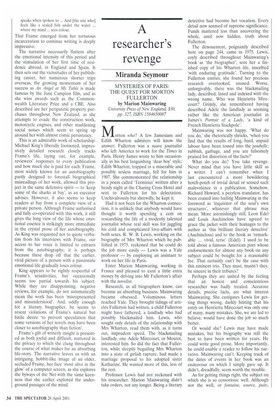Keeping the sharks at bay
Bronwyn Rivers
WRESTLING WITH THE ANGEL by Michael King Picador, £16, pp. 583, ISBN 0330352768 Literary biographies, particularly those of living subjects who, like Janet Frame, expressly prefer seclusion to self-promotion, present a pleasure potentially tempered by worry about voyeurism. Do we need to know about either Jane Austen's love-affairs or Janet Frame's tax returns to understand their fictions? Not necessarily, but small details about persons of large talent can be fascinating, and not always from small-minded motives. Strength may be inspired by watching someone known for eventual success enact the series of stumbles and leaps commonly experienced as life.
Certainly the strength Frame demonstrates in her life-story is inspirational. It is hard not to see a connection between the emotional perceptiveness of her work and the tragedies and pain which seared her early life, and which contributed to her family's view of itself as 'an anvil on which disasters fell'. Two sisters died young of heart failure, she herself attempted suicide, and she was intermittently confined to mental hospitals throughout her twenties, undergoing a course of electric shock treatment for an incorrect diagnosis of schizophrenia. This interlude is perhaps the most compelling in the biography; we are shown the frightening subjectivity of definitions of sanity, and the random power with which they may be wielded. Frame's use of metaphor in responding to psychiatrists' questions occasionally contributed to misdiagnoses. Yet passages from her writing which, paradoxically, confirm her sanity in their sensitive rendering of the difficulties of reconciling interior and exterior lives, often do read like conventional characterisations of madness:
I am two people. The woman who smiles and speaks when spoken to ,.. And [the one who] feels like a scaled fish under the water where my mind ... sees colour.
That Frame emerged from her torturous incarceration to continue writing is deeply impressive.
The narrative necessarily flattens after the emotional intensity of this period and the stimulation of her first time of residence abroad, in England and Spain. It then sets out the vicissitudes of her publishing career, her numerous shorter trips overseas, the growing momentum of her success as An Angel at My Table is made famous by the Jane Campion film, and as she wins awards such as the Commonwealth Literature Prize and a CBE. Also described are her peripatetic property purchases throughout New Zealand, as she attempts to evade the construction work, motorcycle engines, and other maddening social noises which seem to spring up around her with almost comic persistency.
This is an admirable work of scholarship: Michael King's liberally footnoted, impressively detailed research closely tracks Frame's life, laying out, for example, reviewers' responses to every publication and how much she is paid for each. Frame, most widely known for an autobiography partly designed to forestall biographical misreadings of her work, allowed this project in the same defensive spirit — to 'keep some of the sharks at bay', as an executor advises. However, it also seems to keep readers at bay from a complete view of a private person. Although Frame authorised and fully co-operated with this work, it still gives the long view of the life whose emotional essence is strikingly more immediate in the crystal prose of her autobiography. As King was requested not to quote verbatim from his interviews with Frame, our access to her voice is limited to extracts from the autobiography; it is perhaps because these drop off that the earlier, vivid picture of a person with a passionate emotional life gradually loses colour.
King appears to be rightly respectful of Frame's sensitivities, but occasionally seems too partial towards his subject. While they are disappointing, negative reviews, for example, do not automatically mean the work has been 'misrepresented and misunderstood'. And, oddly enough for a literary biographer, he seems to resent violations of Frame's natural but futile desire 'to prevent speculation that some versions of her novels may have been closer to autobiography than fiction'.
Frame's gift of writerly insight is presented as both joyful and difficult, nurtured in the privacy to which she clung throughout the course of what makes for an absorbing life-story. The narrative leaves us with an intriguing, hobbit-like image of an older, secluded Frame, her face 'most alive in the glow' of a computer screen, as she explores the byways of the Net with the same keenness that she earlier explored the underground passages of the mind.



































































 Previous page
Previous page